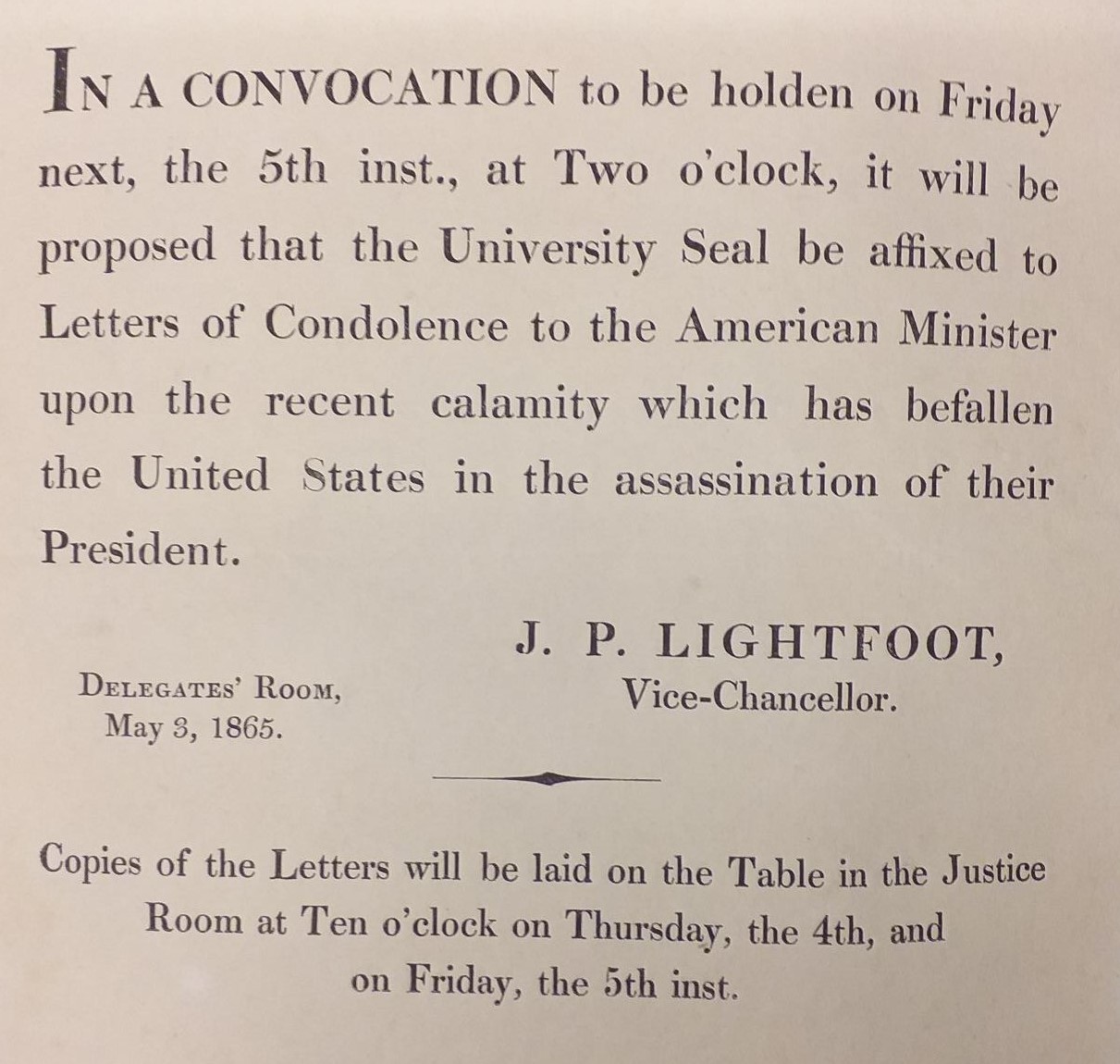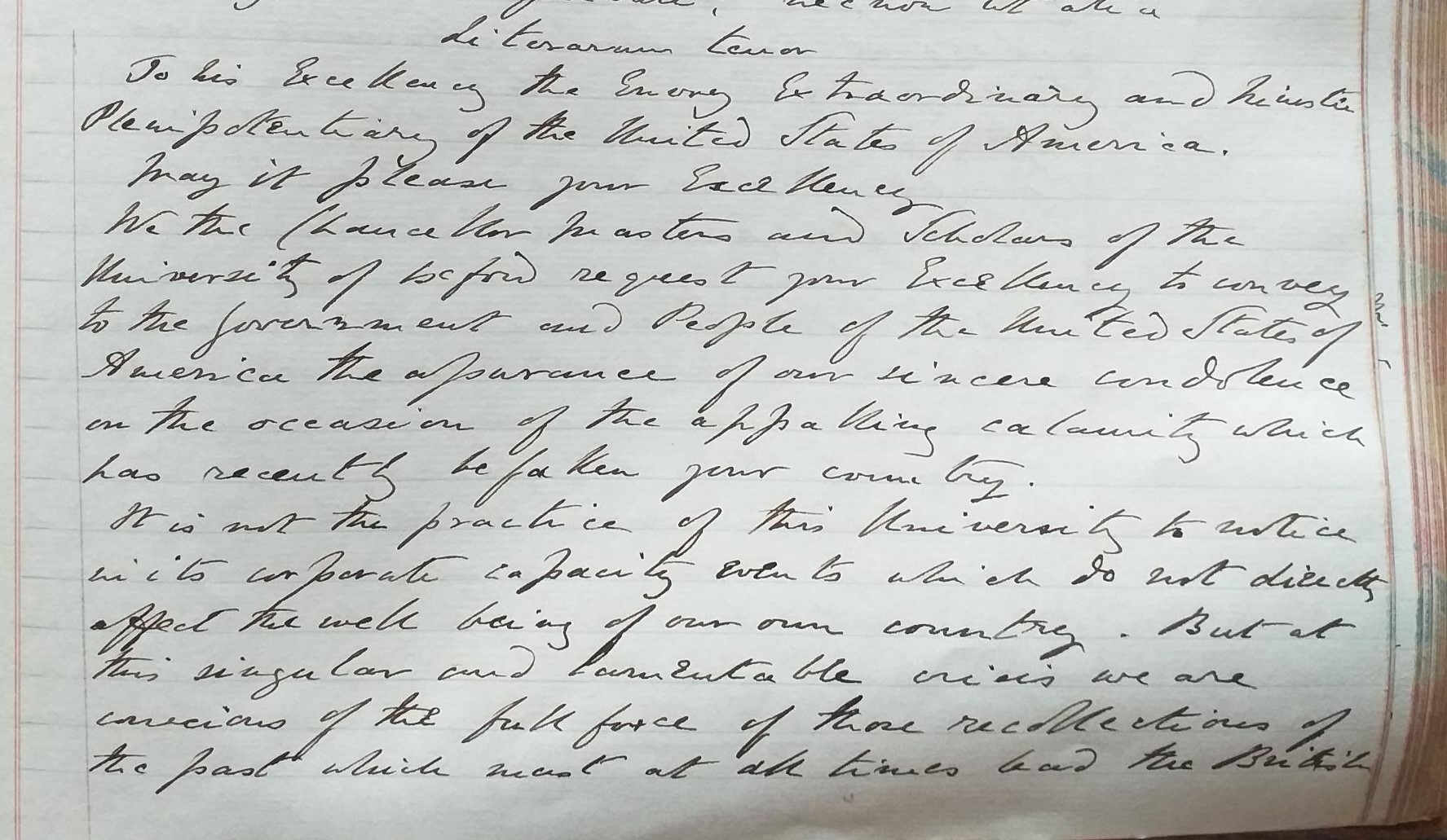By the late nineteenth century, Oxford University had developed strong links with the United States of America going back many years. It had conferred honorary degrees on US ambassadors and ministers, including a Doctorate of Civil Law in 1762 for Benjamin Franklin, one of the Founding Fathers and signatory to the Declaration of Independence. Other figures in the history of the US had studied here: William Penn, founder of Pennsylvania, and Charles Chauncy, President of Harvard from 1654 to 1672, were both students at the University in the 1600s.
So when news reached Oxford of the assassination on 15 April 1865 of the President of the United States, Abraham Lincoln, the University felt the need to respond.

Abraham Lincoln, sixteenth President of the United States, 1863 (source: “Alexander Gardner, Public domain, via Wikimedia Commons. Courtesy of The Library of Congress: https://www.loc.gov/pictures/item/96522529/”)
In the days following the assassination, the Chancellor of the University, the Earl of Derby, wrote to Hebdomadal Council, the University’s executive body, proposing an address of condolence be sent to the US. Hebdomadal Council approved the idea at its meeting of 3 May and the text of the address, in the form of a letter, was drafted. As it was to be sent under the corporate seal of the University, the letter had first to be approved by Convocation (the body of MAs and higher degree holders of the University). Before its next meeting on 5 May, copies of the letter were made available to members of Convocation so that they could read what was proposed to be sent.
The University’s letter itself does not survive in the University Archives, but the text of the letter was copied into the register of Convocation as part of the record of its proceedings. The text of the letter read:
“We the Chancellor Masters and Scholars of the University of Oxford request your Excellency to convey to the Government and People of the United States of America the assurance of our sincere condolence on the occasion of the appalling calamity which has recently befallen your country.
It is not the practice of this University to notice in its corporate capacity events which do not directly affect the well being of our own country. But at this singular and lamentable crisis we are conscious of the full force of those recollections of the past which must at all times lead the British nation to regard with a community of interest the fortunes and destinies of a friendly and a kindred people. In accordance with these sentiments it is the anxious desire of the University to express to your Excellency the abhorrence with which we together with the whole civilized world regard the assassination of the President of the United States.
We would also at the same time express in common with all ranks of our countrymen our earnest hope that by the orderings of a merciful Providence the American people may speedily enjoy the restoration of internal peace and national prosperity.”

Text of letter to the US ambassador from the Register of Convocation, 5 May 1865 (OUA/NEP/subtus/Reg Bu, pp364-5)
Whilst formal addresses by the University were much used at this time as a means of conveying messages from the University as a corporate body, most often to send congratulations or condolences to the current monarch and Royal Family, or to other universities around the world, this expression of sympathy with another nation was unusual. As stated in the letter, the University didn’t generally comment on, or even formally ‘notice’ events which didn’t affect it or the UK directly. But it felt strongly enough about this ‘singular and lamentable crisis’ to step outside of its own conventions.
Convocation approved the text, the University’s seal was attached and the letter was sent. A response from the American ambassador was received and read to Convocation some days later on 11 May but unfortunately the text of that letter does not survive here.
The University’s close relationship with the US has continued and today its citizens are one of the largest groups of international students, academic staff and alumni at the University. Honorary degrees have been conferred on many US citizens including Abraham Lincoln’s successors Jimmy Carter and Bill Clinton; and a University centre for American studies, the Rothermere American Institute exists to promote the study of the culture, history and politics of the United States.
For more information about the University’s links today with the US, see its website at United States of America | University of Oxford .

